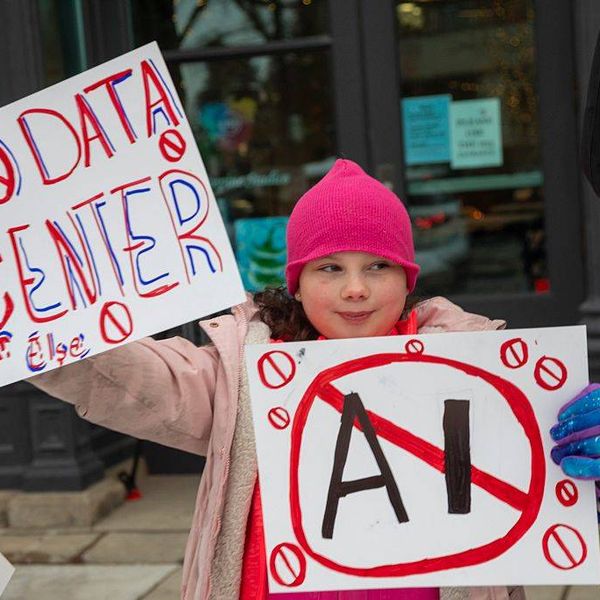Faking It ‘Til We Break It

“Video showing Maduro allegedly torturing Venezuelan dissidents is going viral, with 15 million views and 81k likes already. The only problem? It is actually a scene from a movie.” This tweet from journalist Alan Macleod captured just one droplet in a flood of disinformation following the U.S. capture of Nicolás Maduro. As The Guardian noted, AI-generated images of the event reaped millions of views, instantly saturating social media with fiction.
This cycle repeated days later when Renee Good was killed by an ICE agent in Minnesota. NPR reported that “AI images and internet rumors spread confusion,” fueling a rush to judgment that bypassed all evidence. Rather than awaiting verified facts, the public retreated into partisan scripts: Democrats immediately condemned the agency, while Republicans vilified the victim. This reflexive tribalism illustrates a nation that has abandoned the patience of critical analysis in favor of viral, evidence-free outrage. This reflexive rush to judgment is now weaponized by a new tool of deception: the deepfake.
The emergence of deepfakes has introduced a volatile new dimension to the challenge of disinformation. This technology preys upon systemic vulnerabilities: a widespread lack of media literacy, a ‘greed is good’ hyper-individualism, and a techno-utopian ethos that prioritizes innovation over decency, truth, and social cohesion. The result is a fractured digital landscape where ethically bankrupt creators and profit-driven platforms engineered for engagement oversee the steady demise of civil society. This marriage of cutting-edge deception and ancient tribalism has created a perfect storm where the most successful lie wins and the truth is buried under a million algorithmically-driven clicks. To survive this era of manufactured outrage, we must move beyond passive consumption and demand systemic accountability for the engines of our deception.
The Mechanics of Deception
So-called AI is just the latest tool in a Big-Tech shed that fosters and incentivizes propaganda. Studies have long shown that falsehoods spread more widely than truth on social media, not due to individual behavior, but because Big-Tech platforms are engineered to incentivize the spread of false and misleading content.
AI has complicated the problem of disinformation. Seventy years ago, AI was envisioned as the pursuit of human-like cognitive reasoning; today, that label is frequently marketed to describe technologies that bear little resemblance to those original intellectual ambitions. Modern systems of so-called AI rely primarily on massive datasets and statistical pattern recognition. As a result, they are far from intelligent, and limited in their capacity. Indeed, AI bots are prone to getting things wrong and fabricating information: One study found that AI bot summaries of news content were inaccurate 45% of the time. Other studies have found AI fabricating information from 66% to over 80% of the time.
Beyond deploying bots that circulate misinformation, Big-Tech has released AI tools that empower average users to produce highly convincing, yet entirely fabricated, content with ease. For example, more than 20 percent of videos shown to new YouTube users are “AI slop,” meaning low-quality, mass-produced, algorithmically generated content designed to maximize clicks and watch time rather than inform. These types of deepfakes shaped audience interpretations of recent conflicts such as Israel-Gaza and Russia-Ukraine.
After Maduro’s extraordinary rendition, the internet was quickly flooded with AI-generated content designed to persuade Americans that his capture was an act of justice welcomed by the Venezuelan people. These posts showed Venezuelans supposedly “crying on their knees” to thank President Donald Trump for their liberation. One such video, flagged by Ben Norton, racked up 5 million views.
Similarly, after Good was shot and killed by ICE on January 7, 2026, deepfakes circulated online falsely claiming to reveal the face of the agent involved.
However, the image did not depict the actual agent, Jonathan Ross, an Iraq War veteran with decades of experience in immigration and border enforcement, who had been wearing a mask at the time of the incident.
Ross was not the only one falsely identified; immediately after the shooting, photos circulated online claiming to be of Renee Good. In reality, the images were a confusing mix of a former WWE wrestler and another woman who had previously participated in a poetry contest with the actual victim. The digital desecration continued as users weaponized AI to undress an old photo of Good and manipulate images of her lifeless body, generating deepfakes that placed the victim in a bikini even as she lay at the scene of the shooting.
The Shield of Immunity: Section 230 and Beyond
At a time when approximately 90% of U.S. citizens have access to smartphones and 62% use so-called AI, the U.S. government has largely allowed Big Tech platforms and devices to remain unregulated. Indeed, U.S. policy has favored the tech industry for decades, prioritizing immense corporate profits over meaningful accountability for the societal impacts of these platforms.
Thanks to Section 230 of the Communications Decency Act (CDA), which protects internet platforms from legal liability for content users post, and a religious devotion to the idea that “what’s good for tech is good for America,” these companies enjoy total immunity. Similarly, Trump recently signed an Executive Order shielding the industry from AI regulations at the state level. These actions stem from a shared conviction among Big-Tech and its allies in government that regulation is the fundamental enemy of progress and innovation. The few regulations that do exist typically place the burden on users rather than on platforms, such as requiring individuals to show identification, which further contributes to the surveillance mechanisms that define these tools.
Classroom Capture: Big-Tech’s Educational Influence
In the absence of a robust regulatory framework, many argue that media literacy education offers the most promise for mitigating the influence of misinformation on the public. In the U.S., media literacy is broadly defined as “the ability to access, analyze, evaluate, create, and act using all forms of communication.” Indeed, media literacy education has been associated with a reduction in users accepting disinformation. However, the lack of a central education authority to establish a national curriculum, combined with opposition from traditionalists resistant to new media in the classroom, has significantly hindered the spread of media literacy education. Most Americans lack access to a formal media literacy education, even though more than three-fourths of the population believe it is a critical skill that everyone should develop.
While efforts to integrate media literacy into the classroom are growing, they are increasingly dominated by the very companies they should be critiquing. Big Tech has leveraged the vast wealth gained from harvesting user data to exert an outsized role in shaping educational standards. By offering content and programs for classroom use, these corporations provide tools of “corporate indoctrination.” Their curricula emphasize the opportunities of technology while framing issues like “fake news” and bullying as individual moral failures, such as a lack of character or excessive screen time, rather than systemic results of the dopamine loops and profit models the industry intentionally built.
In contrast, critical media literacy scholars argue that a robust education must teach students to interrogate power dynamics, ownership, platform design, and profit motives. However, because their work challenges the industry, these scholars receive almost no corporate funding and must rely on nonprofits and volunteer labor.
Despite these concerns, educational institutions are leaning further into corporate partnerships. For example, the California State University system, the nation’s largest public university with nearly half a million students, recently announced a $17 million deal with OpenAI, the creator of ChatGPT. This massive investment in “Big Tech” occurred even as the CSU system was simultaneously cutting faculty and staff positions across its 23 campuses.
From Social Capital to Content Creation
While Big-Tech algorithms are complicit, they are not solely to blame. In the post-Cold War era, the United States concluded that capitalism had definitively triumphed over all other systems, treating the Cold War as a final, accurate contest of ideas. This ushered in a fundamental shift in the nation’s cultural and political compass, famously epitomized by the mantra from Oliver Stone’s Wall Street: “greed is good.” Researchers like Robert Putnam, in his influential work Bowling Alone, noted that this shift eroded the social capital and communal bonds essential for a functioning democracy. This hyper-individualistic context has profoundly shaped every generation since, leading to what Jean Twenge and W. Keith Campbell refer to as a “narcissism epidemic.” The nation has become so individualistic that even some people associated with the left, which historically has believed in collectivism, such as Matt Taibbi and Cenk Uygur, joined conservatives in outrage when New York Mayor Zohran Mamdani used the word “collectivism” in his inaugural speech this month.
The resulting culture of narcissistic individualism has engendered a generation of ethically hollow influencers and content creators who worship at the altar of Big-Tech, sacrificing collective integrity for personal profit. As commentator Krystal Ball noted, the incentives for these creators are so perverse that even when videos, such as those regarding Maduro, are debunked, users continue to share them for engagement.
Perhaps the most egregious example is influencer Nick Shirley, who went viral for ‘exposing’ alleged fraud at daycare centers in Minnesota. Although the New York Times had previously reported on a legitimate multimillion-dollar fraud case in Minnesota, where the state and federal governments under the Biden Administration were actively prosecuting individuals for embezzling childcare funds, Shirley fabricated his own distorted narrative. He produced videos alleging a deeper, hidden layer of corruption that the government was supposedly ignoring; however, he relied on a blend of fabricated evidence and baseless accusations to support a “cover-up” narrative that simply did not exist. Nonetheless, Shirley’s video has over 100 million views within a week across different platforms. It was reposted by Vice President J.D. Vance and FBI Director Kash Patel.
Beyond merely inspiring copycat content, these viral fabrications were weaponized by the Trump administration to justify freezing federal funding in five Democratic-led states. Under the guise of addressing fraud and systemic misuse, the administration withheld billions of dollars earmarked for essential childcare and social services. Simultaneously, the Department of Homeland Security deployed as many as 2,000 federal agents to Minnesota in a massive law enforcement surge that resulted in Good’s death.
Shirley reflects a broader culture where viral lies are rewarded with wealth. In this environment, deception has become a viable business model because fraud no longer carries a social stigma when used for profit. Instead, it is often rewarded. Just look at Elon Musk. He is one of the richest men on Earth and was a distributor of some of the fake online content following Maduro’s capture. At the same time, Musk is expanding his wealth in the age of AI with tools that spread baseless racist conspiracies such as the myth of white genocide in South Africa, a new version of Wikipedia that refers to Adolf Hitler simply as “The Führer,” and AI tools that enable users to create deepfake images undressing women and children.
Instead of being treated like a James Bond villain, Musk is worshipped as an aspirational figure. He embodies the ultimate “fake it ’til you make it” con man: a self-brander who convinced the world he was a self-made, intelligent inventor, when in fact he relied heavily on $38 billion in government funding, investments from his father, and piggybacked on the creations of truly brilliant inventors.
The Architecture of Hypocrisy: Why One Standard is No Longer Enough
The toxicity of narcissistic content creators and hyperpartisan figures seeking to expand their brands in the attention economy goes beyond the mere production of falsehoods; it is a symptom of a culture seemingly unable or unwilling to shame even the most glaring contradictions.
For instance, many conservatives backed Trump when he labeled the law enforcement officer who shot a woman during the January 6 Capitol riot a “thug,” yet his allies staunchly defended the agents involved in the Good incident. In fact, even before an official investigation had been launched, let alone concluded, Vice President J.D. Vance argued that Ross possessed “immunity.” Furthermore, while these same circles argue that individuals must take personal responsibility for their actions, rejecting the idea that Trump’s rhetoric created the context for January 6, they paradoxically blame leftists for creating the environment that led to Ross shooting Good.
Yet, even these double standards pale in comparison to the reaction following Charlie Kirk’s death in September 2025. In the ensuing months, conservatives frequently bemoaned a lack of empathy and decorum from the left, which criticized Kirk’s legacy of divisive rhetoric while his wife and loved ones were still grieving. However, those same voices, with notable exceptions such as Tucker Carlson, refused to extend that same grace or “decorum” to the wife and loved ones of Good.
Fox News Channel’s Jesse Watters dismissed Good’s claim that she is a poet and mocked her for listing pronouns in her online bio, a relatively mild attack compared to others. Without evidence, former President Trump called Good a “professional agitator.” Secretary of Homeland Security Kristi Noem labeled her actions an “act of domestic terrorism.” Meanwhile, Vance described Good’s death as a “tragedy of her own making.”
They accompanied these baseless claims with rhetoric directly contradicted by witnesses and video. Trump falsely claimed that Good “viciously ran over” Ross who was recovering in the hospital. In reality, Good’s car did not run over anyone, and Ross walked away from the scene unassisted. Relatedly, a Department of Homeland Security spokesperson, Tricia McLaughlin, falsely claimed that multiple ICE officers were hurt. McLaughlin also falsely accused Good of “stalking agents all day long, impeding our law enforcement.” In reality, video evidence reveals that Good had been on-site for a few minutes. She had just dropped off her now-orphaned six-year-old child at school and was not blocking the road; in fact, cars can be clearly seen passing her vehicle throughout the footage. A crowd had gathered because an ICE vehicle was immobilized in the snow. Unlike the U.S. Postal Service, which is famously expected to operate in all weather conditions—under the creed, “Neither snow nor rain nor heat nor gloom of night stays these couriers from the swift completion of their appointed rounds”—ICE was visibly struggling to function in the elements.
These fabrications and baseless accusations reveal a profound callousness toward Good’s grieving family, most notably her wife and orphaned child. This stands in stark, bitter contrast to the demands for decorum and empathy that conservatives issued following Charlie Kirk’s death. One would expect a civilized nation to extend basic sympathy whenever a citizen dies: whether they are shot during a chaotic political protest or killed and denied medical attention. Faced with such blatant double standards, the nation must finally direct Joseph Welch’s famous rebuke of McCarthyism toward itself: ‘Have you no sense of decency, sir, at long last? Have you left no sense of decency?'”
Rhetorically, most claim to view these incidents as tragedies; in practice, however, they operate with blatant double standards: empathy for one side while displaying callousness, or even cruelty, toward the other. A more sophisticated culture would remember comedian George Carlin’s wisdom: “Let’s not have a double standard. One standard will do just fine.”
Conclusion
To restore the soul of a nation fractured by digital fabrication, there must be a collective refusal to continue this cycle of reflexive tribalism. Engaging in a perpetual war of “us versus them,” where truth is sacrificed for the sake of a partisan win, ensures that everyone loses, and the country remains a casualty of its own division. It is insanity to continue entrusting the national discourse to unregulated algorithms and narcissistic creators, expecting that more of the same will somehow yield a different, more unified result.
The time has come to demand a higher standard: one that prioritizes evidence over engagement and human decency over ideological dominance. By rejecting the lure of the deepfake and the ease of the echo chamber, a path can be cleared toward a more sophisticated culture, one that values critical analysis, insists on corporate accountability, and understands that without a single standard of truth and empathy, the foundations of a functioning democracy cannot hold.







